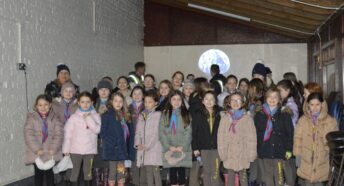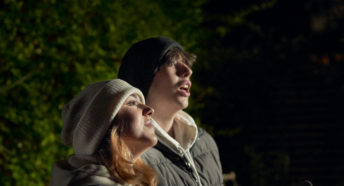Only one in 20 of us can enjoy a starry sky, Star Count results find
Our 2023 Star Count was one of our biggest yet, with almost 4,000 people taking part! But the results suggest that only 5% of people – a figure that drops to just 2.6% in Staffordshire – can enjoy the wonder of a truly dark starry sky.
Although the beauty of a starry night sky is one of the joys of the countryside, our Star Count 2023 results show that, sadly, most people can’t easily enjoy that sight because of light pollution where they live.
Severe light pollution
Star Count is the country’s biggest annual citizen science project of its kind, and took place this year from 17-24 February. Participants reported the number of stars they could see with the naked eye in the Orion constellation.
In Staffordshire, the results show that 70% of people could only see 10 stars or fewer, which indicates severe light pollution. Just 2.6% of those who took part in the county could see 30 stars or more, which indicates truly dark skies.
Emma Marrington, CPRE’s landscape enhancement lead, said:
‘It’s great that so many people took part in Star Count this year. What is clear is that light pollution continues to affect people’s experience of the night sky. Action is needed now!
‘Local councils need a strong approach to manage light pollution. They should ensure local planning and street lighting policies protect dark skies and intrinsically dark landscapes in their areas. We’re also calling for the introduction of minimum standards nationally, to manage external lighting and help cut light pollution.
‘This would be a hugely important step towards strengthened planning to ensure we get well-designed lighting that is only used when and where it is needed. This would protect our existing dark skies for the benefit of current and future generations.’
Why we want a rewilded night sky
There is increasing awareness of the effect that light pollution has on people’s health and wellbeing. In a previous survey, CPRE found half of respondents said that light shining through their bedroom window disrupted their sleep. More than one in ten people (14%) have slept in a different room to avoid light pollution and 3% have moved house to get away from light pollution.
Artificial light is known to cause confusion to migrating birds, often with fatal outcomes. It interrupts natural rhythms, including the reproduction, feeding and sleeping patterns of pollinating insects, bats and other nocturnal animals. In humans, studies show that exposure to light at night interrupts sleep and can disrupt the body’s production of melatonin, a brain hormone best known for its daily role in resetting the body’s biological clock.
Star Count 2023
This annual citizen science project involves counting all the stars in Orion. With your data, we have worked with the Land Use Consultants (LUC) to create a map of light pollution and dark skies. You can view the map of results by clicking the button below. You can also find out more about our work on dark skies here.







